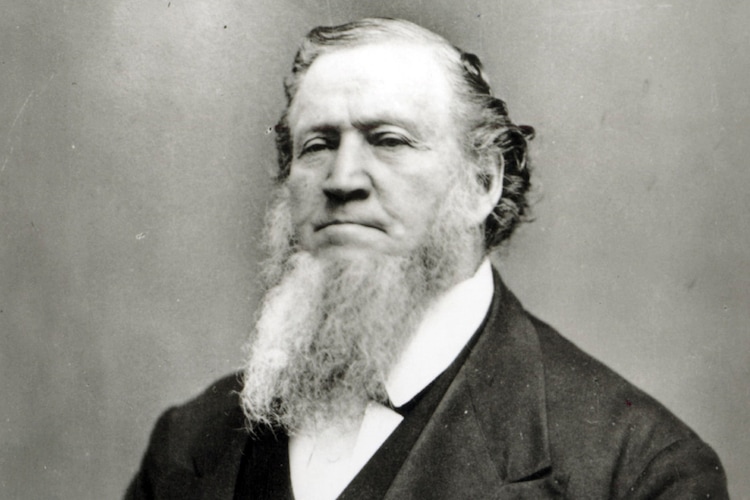In the wake of the investigation into a much-publicized racist outburst at a recent Brigham Young University volleyball match, The Salt Lake Tribune is offering this look at developments in recent years surrounding racial relations at the Provo school and within the ranks of its church owner.
First, a brief history:
BYU is owned and operated by the 192-year-old Church of Jesus Christ of Latter-day Saints, which has always welcomed Black individuals to join the faith. During founder Joseph Smith’s life, leaders ordained Black men to the church’s all-male priesthood.
Then, in 1852, Smith’s immediate successor, Brigham Young, instituted a ban barring Black men from holding the priesthood and Black women from entering the church’s temples.

(Tribune file photo) Brigham Young, second president of The Church of Jesus Christ of Latter-day Saints, instituted the priesthood/temple ban.
That prohibition remained until 1978, when then-President Spencer W. Kimball lifted it.
Today, the Utah-based faith trumpets that “all are alike unto God” and has taken steps publicly in its policies, practices and preachings from the pulpit to call out the sin of racism.
But the pains of prejudice persist to this day — in the church and the wider culture.
Here are some significant Tribune stories and podcasts — by no means exhaustive — over the past decade that shed further light on this topic:
• Black Latter-day Saints wrestle with whether to vote for Barack Obama, the nation’s first Black president, or Mitt Romney, the first Latter-day Saint to top a major party’s presidential ticket. Read the story.
• The LDS Church releases an official essay, tracing the priesthood-temple ban back to Young. Read the story.
• The church celebrates the end of the priesthood/temple ban in a joyous and soulful gala. Read the story. But many Black members say racism lives on in the pews. Read the story.
• Church President Russell M. Nelson and NAACP leaders establish an unlikely alliance, calling for an end to all prejudice. Read the story. Listen to the podcast.
• Activists call on BYU to rebrand the flagship school’s administration building, which bears the name of 19th-century slaveholder Abraham O. Smoot. Read the story. Listen to the podcast.
(Francisco Kjolseth | The Salt Lake Tribune) Peter M. Johnson, general authority Seventy of The Church of Jesus Christ of Latter-day Saints, gives a historic speech at General Conference in Salt Lake City in 2019.
• Peter Johnson becomes the first African American general authority to address the faith’s worldwide General Conference. Read the story.
• Nelson denounces racism in a high-profile speech during General Conference and encourages members to “lead out” against prejudice. Read the story.
• The church mistakenly produces a Sunday school manual that repeats a disavowed teaching that “dark skin,” referenced in its signature scripture, the Book of Mormon, is a curse from God. Read the story.
• In a speech at BYU, Latter-day Saint apostle Dallin H. Oaks, next in line to head up the global faith, calls Black lives matter an “eternal truth all reasonable people should support.” Read the story.
(Screengrab from BYUtv) Apostle Dallin H. Oaks addressed racism at a Brigham Young University address in October 2020, voicing support for the phrase "Black lives matter."
• BYU releases a report saying its students of color feel “isolated and unsafe” due to racism on campus and later sets up an Office of Belonging. Read the story. Listen to the podcast.
• In the first speech by a Black BYU faculty member at a campus devotional in 14 years, sociology professor Ryan Gabriel urges Latter-day Saints to extinguish the “sin of racism.” Read the story.
• The Genesis Group, a support congregation for Black Latter-day Saints, celebrates its golden anniversary. Read the story. One of its co-founders, Darius Gray, perhaps the most beloved living Black Latter-day Saint, talks about worshipping in a mostly white faith. Listen to the podcast.
(The Church of Jesus Christ of Latter-day Saints) Darius Gray, Genesis Group president from 1997 to 2003, speaks at the 50th anniversary of the Genesis Group in the Tabernacle on Temple Square, Salt Lake City, on Oct. 23, 2021.
• A BYU professor makes dismissive remarks about Black Latter-day Saints and the former priesthood/temple ban. He later apologizes but questions remain about how widely those retracted views still linger in the church. Read the story. Listen to the podcast.
• Dubbing themselves the Black Menaces, some BYU activists videotape fellow students to document their attitudes about race. Read the story. Listen to the podcast.
(Rick Egan | The Salt Lake Tribune) Primary general President Susan H. Porter, left, and her second counselor, Tracy Y. Browning, chat with church leaders during the April 2022 General Conference. Browning is the first Black Latter-day Saint to serve in a worldwide presidency of the Utah-based church.
• Tracy Yeulande Browning becomes the first Black woman appointed to a churchwide presidency. Read the story.
• As part of its partnership with the NAACP, the church sends dozens of African American students to Ghana to learn about the historical connections between that West African nation and the U.S. civil rights movement. Read the story.








